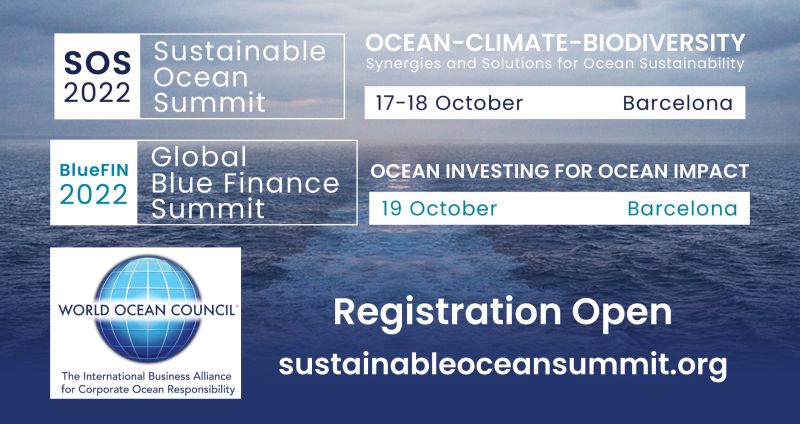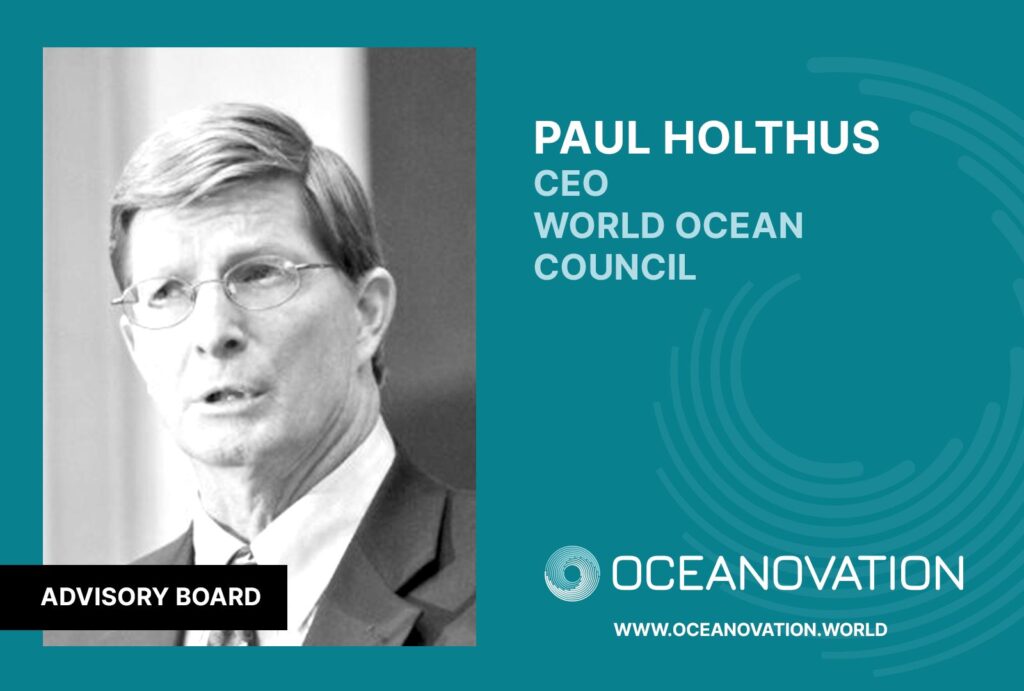Paul Holthus, founder and CEO of World Ocean Council, is an essential figure in the field of marine sustainability and conservation of coastal resources. With more than 15 years at the helm of this global organization, he has worked to improve corporate responsibility practices towards the oceans. Its commitment extends over more than 30 countries across the world, particularly in Europe, Asia and the Pacific, where he has contributed to the sustainable development of maritime resources. In addition to his efforts to influence the international political agenda on maritime issues, Holthus has also taken a particular interest in the impact of climate change onblue economy.
|
IN BRIEF
|

Table of Contents
TogglePaul Holthus: A Key Player in Ocean Sustainability
Paul Holthus is an iconic figure in the field of marine sustainability and coastal resource conservation. As President and CEO of World Ocean Council (WOC), Holthus has dedicated more than 15 years to leading a global alliance focused on corporate responsibility for the oceans. His passionate commitment to marine sustainability has made him an influential spokesperson on maritime issues internationally.
Originally from the United States, Holthus developed an interest in maritime matters at an early age. His career quickly shifted toward sustainability, where he saw the importance of balancing economic needs with environmental conservation. Before founding the World Ocean Council in 2009, he was involved in various projects relating to the management of maritime resources. His experience covers more than 30 countries spread across the European, Asian, Pacific and Central continents, which demonstrates his international commitment.
Under his leadership, the WOC played a central role in formulating new standards and practices for the maritime sector. Holthus has succeeded in bringing together industry players, governments and NGOs around a common vision: promotingblue economy, which aims to use maritime resources sustainably. Its objective is to create a collaborative network to share best practices and innovations in the marine field.
Paul Holthus has also worked to ensure that issues of climate change and sustainable development are systematically integrated into maritime policies. Through initiatives such as international conferences and forums, it has highlighted the importance of business engagement in ocean protection. This has helped to raise awareness among economic players of environmental challenges, encouraging them to adopt more responsible practices.
Another dimension of Holthus’ commitment is its pragmatic approach to innovation and research. By coordinating projects that connect science, technology and the private sector, he has encouraged the development of initiatives that promote the sustainability of ocean resources. In this context, it has also supported the emergence of innovative start-ups within the blue economy ecosystem, thus contributing to a more sustainable future.
In the course of its activities, Holthus has been recognized for its ability to establish strategic partnerships. Whether with universities, government agencies or non-governmental organizations, he has created synergies that benefit the protection of the oceans. His influence also extends to political discussions, where he advocates for regulations favoring sustainable maritime development.
In 2024, after 15 years of leadership at the World Ocean Council, Paul Holthus will step down, but his legacy of marine sustainability and corporate responsibility will continue to inspire future generations of maritime stakeholders. His exemplary career highlights the importance of a collaborative approach to preserving our oceans, a major challenge of the 21st century.
Ocean sustainability has become a crucial issue globally and Paul Holthus, as founder and CEO of World Ocean Council, plays a central role in highlighting this issue. His commitment to marine conservation and sustainable development spans more than 40 years, giving it invaluable expertise to promote initiatives for a responsible and sustainable blue economy.
A leader in the blue economy
The vision of Paul Holthus for the blue economy is based on the principle that maritime resources must be managed sustainably. By relying on international collaborations, it has been able to bring together diverse actors such as governments, businesses and NGOs, to tackle environmental challenges together. This collaborative approach will help promote economic development while preserving marine ecosystems, a necessity in the face of growing threats from human activities.
Initiatives for sustainability
Under the direction of Paul Holthus, the World Ocean Council has launched several initiatives aimed at advancing ocean sustainability. For example, the exchange platform between companies allows them to share their best practices in terms of environmental responsibility and sustainability. In addition, the promotion of sustainable fishing and commitment to responsible aquaculture are at the heart of its strategy to ensure a healthy marine future.
A commitment to future generations
The long-term vision of Paul Holthus is also focused on raising awareness of maritime issues among younger generations. By collaborating with educational institutions and launching training programs, it helps to train tomorrow’s leaders who will be able to defend sustainable management of ocean resources. This investment in human capital is vital to establishing a future where oceans can continue to thrive and support life on our planet.
The crucial role of economic actors
Paul Holthus also emphasizes that the transformation of the economic framework is essential to achieve real sustainability. Businesses have a crucial role to play in the transition to blue economy which respects ecological limits. By integrating sustainability principles into their business models, companies can not only reduce their environmental impact, but also generate long-term profits. Commitments such as those promoted by Holthus pave the way for a new economic paradigm that values the health of marine ecosystems.
A look to the future
As he approaches his planned departure at the end of 2024, Paul Holthus leaves behind a lasting legacy marked by significant advances in global networking and partnership building. His work will continue to inspire efforts for responsible ocean management and highlight the importance of adopting strategies that promote marine sustainability at all levels. The challenges remain immense, but the commitment of Holthus towards a sustainable maritime future remains a source of hope for all those working in this direction.
Paul Holthus, head of World Ocean Council (WOC), has distinguished himself as a visionary leader in the fight for ocean sustainability. Its commitment to the sustainable development of marine resources is particularly impressive, spanning more than 30 countries around the world. With his work in Europe, Asia, the Pacific and beyond, Holthus has not only advocated for responsible management of maritime resources, but has also helped raise awareness of crucial ecological issues.
An impressive journey serving the oceans
For more than four decades, Paul Holthus has combined expertise in sustainable development and a deep commitment to protecting the ocean environment. By founding the World Ocean Council in 2009, it created a unique platform for dialogue and cooperation between different stakeholders of the blue economy. This includes businesses, governments and NGOs, working together to navigate towards more sustainable practices.
An influential voice in the face of marine challenges
Holthus positions itself as a key player on an international scale. With in particular its support for sustainable fishing initiatives and programs aimed at reducing the impact of climate change on marine ecosystems, he is a strong advocate of the need for action at all levels. For example, its response to the prevalence of unsustainable and illegal fishing represents growing concern for the future of fish stocks. Through efforts like the initiative launched by MSC to promote responsible fishing practices, he was able to make his voice heard and bring about significant change.
Visionary and sustainable leadership
Paul Holthus’ leadership is characterized by his ability to establish a constructive dialogue on complex themes. As president and CEO of the WOC, he was able to develop an in-depth understanding of the issues ofblue economy. Its action has also made it possible to integrate sustainable innovations, essential to promoting a resilient marine future. In this sense, the report on the blue economy analyzes the economic opportunities, while emphasizing the importance of the sustainability of maritime resources. His desire to integrate the marine biotechnology in development strategies is an example of his proactive and innovative approach.
From global issues to local actions
By favoring a multidisciplinary approach, Holthus knows how to make the link between global issues and local actions. Its ability to mobilize stakeholders around the maritime agenda is essential to advance international negotiations on ocean sustainability. As a visionary, he inspires a new generation of actors in the marine preservation who understand the importance of concerted action in the face of ever more pressing environmental issues.
A legacy to build
As his term nears the end of his term in 2024, there is no denying that Paul Holthus’ impact on the maritime ecosystem is lasting. His contributions to the development of standards of social responsibility in the marine sector continue to lay the foundations for a future more respectful of our oceans. As he prepares to hand over the reins, the challenges remain many, but his legacy is clear: a call to action to protect the oceans, essential to the survival of our planet.









